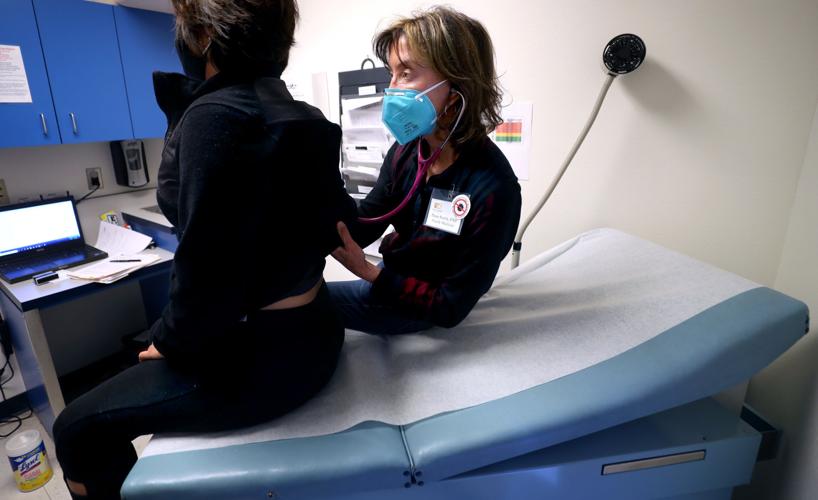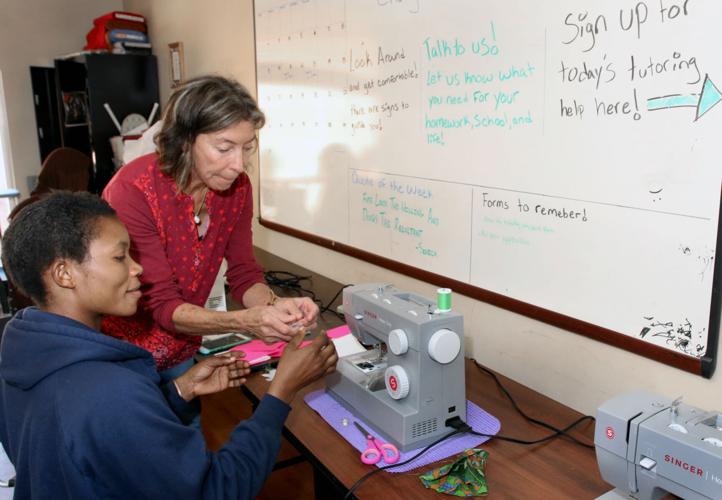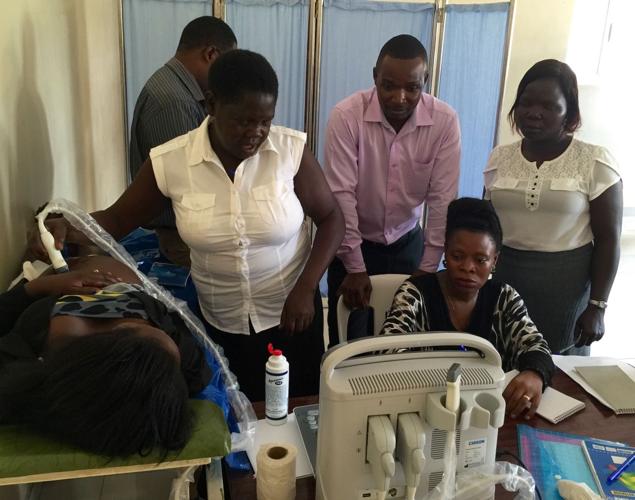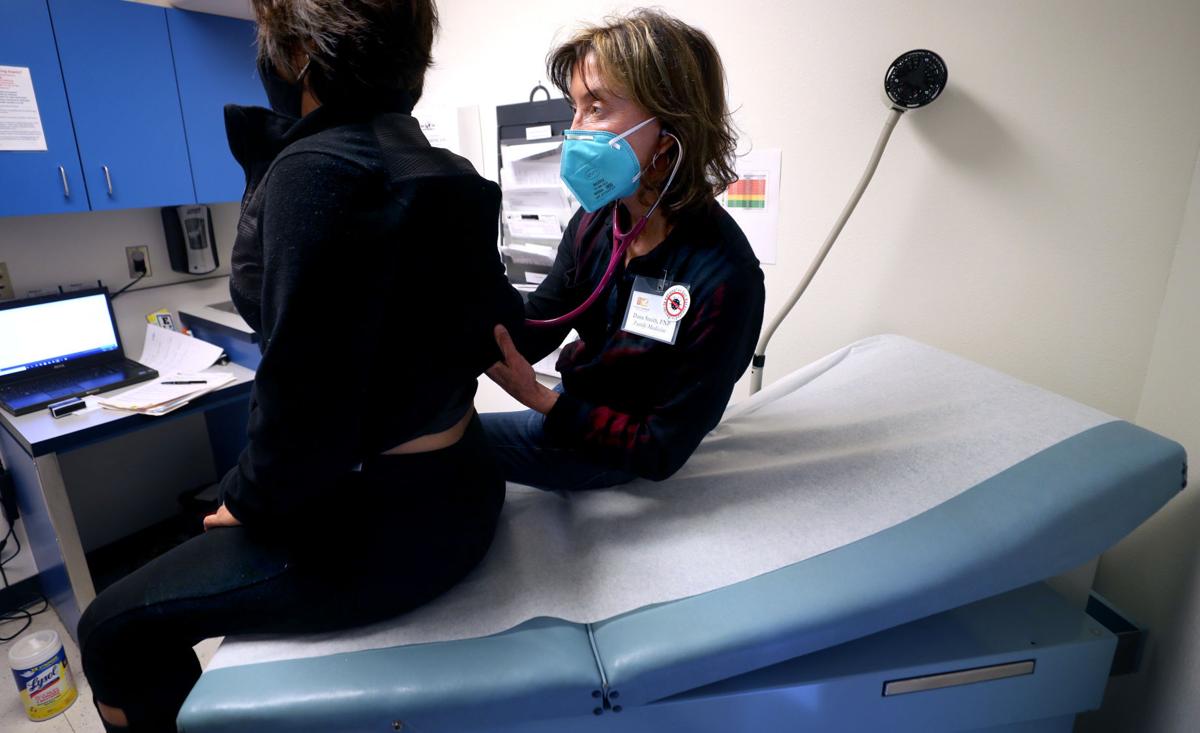The website of Clínica Amistad, a free clinic on Tucson’s south side, includes a video introducing volunteers who work there — students, nurses, physician assistants, doctors, laypeople, a beloved priest. They talk about friendships formed in the clinic, and community.
“People come here to help people,” comments a young nursing student, “and that says everything about those who volunteer here.”
One of those volunteers is Dana Smith — retired nurse practitioner, health-care trainer and artist.
Mom and baby javelina: Wait until you see the little cutie
Recently, on a patio in her Tucson Mountains home, surrounded by saguaros and some of her colorful, ceramic human/animal (at times dinosaur) hybrid sculptures, the 64-year-old Smith talked about giving back.
“It’s wonderful to be involved in your community, and to connect with people who feel the same,” Smith says.
That impulse — plus her fondness for dinosaurs and fossils and a life philosophy — she attributes to her father, a civic-minded museum director. Retired after 20 years at St. Elizabeth of Hungary health clinic, Smith now trains medical providers in Uganda, helped establish a profitable refugee sewing project in Tucson and treats patients at Clínica Amistad.
The Ugandan Rotarians for Family Health and AIDS Prevention project, opened in 2013 by Green Valley Rotarian Dr. Phil Silvers, provides medications and training for Ugandan health caregivers in nationwide free clinics. Smith has been on his team since its inception, and it presented her with a gratifying challenge.
During the initial trip to train nurses, medics, and midwives, she befriended a midwife who worked in a poor rural area. Back in the U.S., in a letter exchange, Smith inquired whether there was something she could offer the midwife to help her practice.
“I thought books,” she says. “A stethoscope. But no! An ultrasound machine,” she laughs.
Not only was she thousands of miles away and ultrasounds were expensive, but one would probably be stolen or confiscated before it reached its destination. In the end, they found funding for 10 portable ultrasound machines, which she wrangled from a Chinese manufacturer, and had successfully delivered to Uganda labeled “veterinary equipment.”

Nurse midwives in Uganda now have 10 portable ultrasound machines after Dana Smith helped find funding for them. Smith, a retired nurse practitioner, health-care trainer and artist, has been with Ugandan Rotarians for Family Health and AIDS Prevention project since its inception.
“We immediately began hearing good news,” she says. “One of the nurse midwives was attending a young patient who was bleeding and accusing the midwife of witchcraft. The ultrasound machine showed a potentially fatal ectopic pregnancy. Wow!”
Word got out, more women attended their regular appointments, and “the more the patients, the more they were able to do group teaching.” Eventually, 30 midwives were trained on the equipment.
“Dana is a gifted trainer,” Silvers says.
She managed to make even a difficult course involving physics popular. When she discovered that many of her trainees couldn’t identify the organs of the female reproductive system, she bought them wall posters. She arranged a hospital field trip for trainees to learn to evaluate and adjust caregivers’ interaction with patients.
“She has done so much for health care in Uganda,” Silvers says. “She has done even more for the image of the United States and Rotary.”
The COVID-19 pandemic prevented the African outreach last year, but it did provide a local project: mask making. After her years at St. Elizabeth of Hungary, Smith was familiar with the refugee community in Tucson. Having already participated in a sewing project for refugee women, when the pandemic hit, she retooled and taught the refugees to sew protective masks. She and her group provided the materials and sewing machines, and paid them for their production.
Educator and community volunteer Cheryl Lockhart, who joined her friend in the sewing project, says Smith succeeds because she is authentic, unpretentious, and deft at overcoming cultural and language differences.
“It always amazed me how much she knew,” writes Lockhart, “and how they confided in her. She seemed to know everything about every woman, including where they lived (she made home visits), how they got to the center, and other details (whose son was in jail; whose daughters loved school).”

Dana Smith helps Mwamini Erasto, from the Democratic Republic of the Congo, learn to thread a sewing machine as she takes her first sewing lesson at the Tucson Refugee Women Sewing Project at Lutheran Social Services of the Southwest.
That ability to connect carries through to health care at Clínica Amistad.
The mission at Clínica Amistad — established in 2003 in the El Pueblo Neighborhood to serve Tucson’s uninsured, low-income community — suits Smith’s predilection for personal engagement.
“You get to spend 20-30 minutes with each patient,” she says, allowing her to identify underlying problems. “Treatment begins with listening.”
And COVID-19 has presented some new ways of listening.
She’s seeing more cases of undiagnosed depression these days. When a patient came in complaining of stomach pain, headache and sleep problems, and tests revealed no physical causes, Smith tried a different, indirect tack.
“Some people,” she told the woman, “when they experience symptoms like these, are actually depressed. Do you feel this happening to you?” And the woman broke down. “I’m afraid,” she admitted. “I’m so afraid of dying.”
So Smith’s treatment addressed the fear.
Back at the conversation on her patio, she mused about her life as a volunteer.
“I’ve been lucky,” she said. “I’ve been in the right place at the right time, and I have good friends” who have helped her take advantage of opportunities. Like the folks in the Clínica Amistad video, Dana Smith is part of a community that serves the community.
And her other retirement activity, oil painting and ceramic sculpture, by the way? Inspired. Also whimsically mischievous. Picture an angelic child cradling a javelina, a cloned-sheep Dolly with a human face, Triceratops Madonna and Child; a pearls-adorned goat cheating at Pin the Tail on the Donkey.
Photos: COVID-19 vaccinations in Tucson, Pima County
COVID-19 vaccination clinic, retirement community
Updated
Otilia Aragon, a resident of The Fountains at La Cholla retirement community, reaches out to touch the face of her daughter Melinda Aragon-Morales, a pharmacist with CVS, who administered the Moderna vaccine to her mother during a Coronavirus (COVID-19) vaccination clinic at The Inn At The Fountains, 5830 N Fountains Ave., on Feb. 9, 2021. "I was really excited," Morales said about administering the vaccine to her mother, "especially in this kind of setting where we haven’t been able to see [family] in a long time." Morales had not seen her mother in several months due to the ongoing pandemic. The clinic is the first of two days where the 585 residents and staff at the retirement community will receive vaccinations for COVID-19.
COVID-19 vaccinations, University of Arizona Mall
Updated
People are directed into the line at the University of Arizona's COVID-19 drive-thru vaccination facilities on the UA Mall in Tucson, Ariz., February 5, 2021.
COVID-19, clinic, TCC
Updated
The line wends though the parking lots and along the southeastern doors and windows outside the Tucson Convention Center as hundreds wait in line for hours to get the first shot of the COVID-19 vaccine, Tucson, Ariz., February 4, 2021. The age cut off for vaccination was lowered to 70 years of age.
COVID-19 vaccinations, PIma County, Hacienda at the Canyon

Resident Victor Braun laughs with a CVS Pharmacy health care worker after getting his first dose of the Moderna COVID vaccine at Hacienda at the Canyon, Tucson, Ariz., January 27, 2021. The facility's residents and staff were part of a two day vaccination program in conjunction with CVS Pharmacy and monitored by the in-house personnel from TMCOne clinic.
COVID-19 vaccinations, PIma County, Hacienda at the Canyon

A health care worker with CVS Pharmacy preloads a syringe with the first dose of the Moderna COVID vaccine at Hacienda at the Canyon, Tucson, Ariz., January 27, 2021. The facility's residents and staff were part of a two day vaccination program in conjunction with CVS and monitored by the in-house personnel from TMCOne clinic.
COVID-19 vaccinations, PIma County, Hacienda at the Canyon

Gordon Starr quickly gets his first dose of the Moderna COVID vaccine at Hacienda at the Canyon, Tucson, Ariz., January 27, 2021. Starr was among the facility's residents and staff taking part in a two day vaccination program in conjunction with CVS Pharmacy and monitored by the in-house personnel from TMCOne clinic.
COVID-19 vaccinations, PIma County, Hacienda at the Canyon

Nurse Jose Cruz helps member Nelda Clark get her next appointment photographed and stored in her phone after she got her first dose of the Moderna COVID vaccine at Hacienda at the Canyon, Tucson, Ariz., January 27, 2021. The facility's residents and staff were part of a two day vaccination program in conjunction with CVS Pharmacy and monitored by the in-house personnel from TMCOne clinic.
COVID-19 vaccinations, PIma County, Hacienda at the Canyon
Updated
James Sugg gets his first dose of the Moderna COVID vaccine at Hacienda at the Canyon, Tucson, Ariz., January 27, 2021. Shannon Ruedlinger, executive director of the facility said that 250 doses were scheduled to be administered to staff and residents there during their two day vaccination program.
COVID-19 vaccinations, PIma County, Hacienda at the Canyon

Member Terrence Carden get his first dose of the Moderna COVID vaccine on the second day of a two program at Hacienda at the Canyon, Tucson, Ariz., January 27, 2021. Shannon Ruedlinger, executive director of the facility said that 250 doses were scheduled to be administered to staff and residents there during their two day vaccination program.
COVID-19 vaccinations, PIma County, Hacienda at the Canyon

Constance Jill Hofer gets her first dose of the Moderna COVID vaccine at Hacienda at the Canyon, Tucson, Ariz., January 27, 2021. Shannon Ruedlinger, executive director of the facility said that 250 doses were scheduled to be administered to staff and residents there during their two day vaccination program. Vaccinations were administered in conjunction with CVS and members monitored by the facility's in-house TMCOne nurses.
COVID-19 vaccinations, PIma County, Hacienda at the Canyon
Updated
Right now, Pima County is in Phase 1B of its vaccination plan and is inoculating people 70 and older, and law enforcement, education and child care providers.
COVID-19 vaccinations, Pima County
Updated
Clifford Daigler, registered nurse, receives a Pfizer COVID-19 vaccine at Tucson Medical Center, 5301 E. Grant Rd., in Tucson, Ariz. on Dec. 17, 2020. Banner-University Medical Center and Tucson Medical Center began administering Pfizer’s COVID-19 vaccines to healthcare workers in Pima County. TMC administered 1,100 total vaccines between their two clinic sites in the first day of vaccinations, said Claudia Koreny, director of pharmacy for TMC.
COVID-19 vaccinations, Pima County
Updated
Needles containing the Moderna vaccine in the Tucson Medical Center drive-thru tent at, on Jan. 5, 2021.
COVID-19 vaccinations, Pima County
Updated
Ann Boice receives the Coronavirus (COVID-19) vaccine during the administration vaccination to members of the public who meet the 1B priority eligibility of at Tucson Medical Center's Marshal Center, on Jan. 15, 2021.
COVID-19 vaccinations, Pima County
Updated
Annie Waits, a volunteer nurse and vaccinator, administers the Moderna vaccine to a patient in the drive-thru program at the Tucson Medical Center, on Jan. 5, 2021.
COVID-19 vaccinations, Pima County
Updated
Steve Patalsky, left, associate director of pediatric bone-marrow transplant, goes over information about the COVID-19 vaccine with Sayea Jenabzadeh, nurse anesthetist, inside the COVID-19 vaccine observation stage at Banner-University Medicine North, 3838 N. Campbell Ave., in Tucson, Ariz. on Dec. 17, 2020. The first round of Pfizer's COVID-19 vaccines were given to healthcare workers at Banner-University Medical Center and Tucson Medical Center.
COVID-19 vaccinations, Pima County
Updated
Amy Lopez, left, registered nurse in peri-operative service, and her husband Dr. Mike Lopez, anesthesiologist, talk while waiting for their 15 minutes observation period after receiving their COVID-19 vaccine at Tucson Medical Center, 5301 E. Grant Rd., in Tucson, Ariz. on Dec. 17, 2020. The first round of Pfizer's COVID-19 vaccines are given in Pima County to healthcare workers at Banner-University Medical Center and Tucson Medical Center. "It felt like a normal shot," said Amy Lopez. When asked if they were nervous, Dr. Mike Lopez answered "I was ready to be patient one."
COVID-19 vaccinations, Pima County
Updated
Samantha Penn, pharmacist, waits in line with other healthcare workers while people get checked-in for their COVID-19 vaccination appointments at Tucson Medical Center, 5301 E. Grant Rd., in Tucson, Ariz. on Dec. 17, 2020.
COVID-19 vaccinations, Pima County
Updated
After receiving the second Pfizer COVID-19 vaccine in Pima County, Melissa Zukowski, medical director of emergency department at Banner-University Medicine Tucson, gives a thumbs-ups to her daughter Sophia Smallwood, left, at Banner-University Medicine North, 3838 N. Campbell Ave., in Tucson, Ariz. on Dec. 17, 2020.
COVID-19 vaccinations, Pima County
Updated
Leticia Riesgo, a City of Tucson employee, helps check people into the vaccination clinic for Phase 1B.1.b Prioritized Essential Workers at the Tucson Convention Center, on Jan. 21, 2021. The TCC clinic administered 686 out of a projected 600 vaccines on Jan. 20. They were over 300 vaccinations at midday on Jan. 21.
COVID-19 vaccinations, Pima County
Updated
A person walks past a sign for the vaccination clinic for Phase 1B.1.b Prioritized Essential Workers at the Tucson Convention Center, on Jan. 21, 2021.
COVID-19 vaccinations, Pima County
Updated
Iris Delfakis, oncology nurse navigator for the Arizona Cancer Center, looks to other nurses as she waits to receive a Pfizer COVID-19 vaccine from nurse Cristina Torres.
at Banner-University Medicine North, 3838 N. Campbell Ave., in Tucson, Ariz. on Dec. 17, 2020. The first round of Pfizer’s COVID-19 vaccines are given in Pima County went to healthcare workers at Banner-University Medical Center and Tucson Medical Center.
COVID-19 vaccinations, Pima County
Updated
Tucson Police Officer Roman Acosta is administered the Moderna vaccine at a Coronavirus (COVID-19) vaccine clinic at the Tucson Convention Center located at 260 S. Church Ave., on Jan. 15, 2021.
COVID-19 vaccinations, Pima County
Updated
Tal Caspi, a volunteer, answers questions for members of the public before they receive their first vaccine shot for the coronavirus at the Kino Sports Complex, 2500 E. Ajo Way in Tucson, Ariz., on January 18, 2021. Members of the public who fall into the Phase 1B group are eligible for the vaccine at this time. Phase 1B includes people over 75 years old, educators and first responders.
COVID-19 vaccinations, Pima County
Updated
Tom Woythal, 85, and his wife, Elizabeth, 82, wait for their opportunity to receive a vaccination shot for the coronavirus at the Kino Sports Complex, 2500 E. Ajo Way in Tucson, Ariz., on January 18, 2021. Woythal says he had been waiting 55 minutes but was happy to wait. Members of the public who fall into the Phase 1B group are eligible for the vaccine at this time. Phase 1B includes people over 75 years old, educators and first responders.
COVID-19 vaccinations, Pima County
Updated
A patient looks over paperwork while waiting 15 minutes after receiving the Coronavirus (COVID-19) vaccine at Tucson Medical Center's Marshal Center, on Jan. 15, 2021.
COVID-19 vaccinations, Pima County
Updated
Tucson Police Department Chief Chris Magnus receives the Moderna vaccine at a Coronavirus (COVID-19) vaccine clinic at the Tucson Convention Center located at 260 S. Church Ave., on Jan. 15, 2021.
COVID-19 vaccinations, Pima County
Updated
People wait in the to be given the Coronavirus (COVID-19) vaccine as members of the public who meet the 1B priority eligibility are now being allowed to receive the vaccination at Tucson Medical Center's Marshal Center, on Jan. 15, 2021.
COVID-19 vaccinations, Pima County
Updated
People eligible for the 1B phase of Coronavirus (COVID-19) vaccination stand in line outside the Tucson Medical Center's Marshal Center to receive the shot, on Jan. 15, 2021.
COVID-19 vaccinations, Pima County
Updated
A pharmacist prepares a Coronavirus (COVID-19) vaccine to be administered to members of the public who meet the 1B priority eligibility of at Tucson Medical Center's Marshal Center, on Jan. 15, 2021.
COVID-19 vaccinations, Pima County
Updated
Sgt. Michael Moseley receives the Coronavirus (COVID-19) vaccine during the administration of the vaccination to members of the public who meet the 1B priority eligibility of at Tucson Medical Center's Marshal Center, on Jan. 15, 2021.
COVID-19 vaccinations, Pima County
Updated
People eligible for the 1B phase of Coronavirus (COVID-19) vaccination stand in line outside the Tucson Medical Center's Marshal Center to receive the shot, on Jan. 15, 2021.
COVID-19 vaccinations, Pima County
Updated
Pharmacists prepare Coronavirus (COVID-19) vaccinations to be administered to members of the public who meet the 1B priority eligibility of at Tucson Medical Center's Marshal Center, on Jan. 15, 2021.
COVID-19 vaccinations, Pima County
Updated
Mike Collier, a volunteer doctor with the Medical Reserve Corps, administers a Coronavirus (COVID-19) vaccine while working his shift in the drive-thru vaccination program at the Tucson Medical Center, on Jan. 8, 2021.
COVID-19 vaccinations, Pima County
Updated
“We thought this would be a more efficient and timely process,” says Arizona AARP director Dana Kennedy. “Did they overpromise?”
COVID-19 vaccinations, Pima County
Updated
Pharmacist Keith Boesen (right) drops off needles containing the Coronavirus (COVID-19) vaccine at the station of Mike Collier (left), a volunteer doctor with the Medical Reserve Corps, during the drive-thru vaccination program at the Tucson Medical Center, on Jan. 8, 2021.







